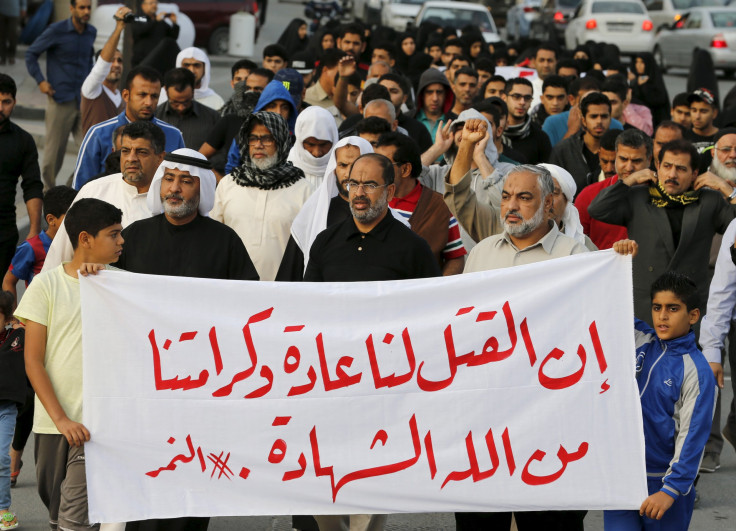Execution Of Nimr Al-Nimr, Outspoken Critic Of The Saudi Government, Raises Sectarian Tensions Across The Middle East

UPDATE: 4:01 p.m. EST — Angry demonstrators in Tehran were seen removing the Saudi Arabian flag from the Saudi Embassy in the Iranian capital in protest of the execution of the Shiite leader Nimr al-Nimr. The embassy was ransacked.
Iranian protesters in #Mashad take #Saudi flag off consulate to protest execution of #SheikhNimr. pic.twitter.com/5ciNxFCYYS
— Hamid Reza (@hamid3663) January 2, 2016Original story:
The execution of a prominent Shiite religious leader in Saudi Arabia has drawn angry reactions across the Shiite world, from Pakistan to Lebanon. In Bahrain, security forces fired tear gas Saturday at demonstrators carrying pictures of the controversial preacher, while Iran denounced the act as irresponsible and likely to elevate tensions further.
Nimr al-Nimr, who had been a driving force of protests in recent years by Saudi Arabia’s marginalized Shiite community, centered largely in eastern Saudi Arabia, was one of 47 people across the country executed by the government Saturday. Nimr and the others were accused of being terrorists.
“The recompense of those who wage war against Allah and his messenger and do mischief in the land is only that they shall be killed or crucified,” read a statement from Riyadh’s Interior Ministry, citing the Quran. Nimr was accused of ascribing to “takfiri” ideology, in which Muslims accuse other Muslims, in this case members of the Saudi government, of being apostates, a serious crime in Islamic law.
The executions came on the same day a Saudi-led regional coalition ended a ceasefire in Yemen, where Saudi Arabia is battling Shiite Houthi rebels.
In a dangerous move, #SaudiArabia executed Shi'ite cleric Nimr al-Nimr/ Saudis are playing with Fire pic.twitter.com/fFluxsuada
— mehdi abbasi (@mehdiamoli1) January 2, 2016Hossein Jaberi Ansari, Iran's Foreign Ministry spokesman, denounced the action.
“The execution of a personality such as Sheikh Nimr, who had no means other than speech to pursue his political and religious objectives, only shows the depth of imprudence and irresponsibility,” Ansari said in a statement posted to Iran’s Press TV, accusing the Saudi government of supporting terrorism and “takfiri extremists” in the region.
The execution was met with condemnation from Bagdad’s Shiite political bloc, which has called for the closing of the recently reopened Saudi Embassy in Iraq, expelling Saudi diplomats and executing Saudis in Iraqi prisons. Nouri al-Maliki, the former Iraqi prime minister, condemned the execution in a strongly worded statement. “Executing Sheikh al-Nimr will topple the Saudi regime as the crime of executing the martyr al-Sadr did to [former Iraqi President] Saddam [Hussein]," he said, referring to Muhammad Baqir al-Sadr, a popular Iraqi Shiite cleric who was executed by Hussein in 1980 for expressing support for the Iranian Islamic Revolution.
Demonstrations erupted in Karachi, Pakistan, Saturday among Shiites, who called Nimr a martyr and demanded human rights organizations conduct a fact-finding investigation.
I'm really out of words. I'm angry & I want to cry.
Saudi Arabia beheads 47 people including Shia cleric & activist Sheikh Nimr al-Nimr.
— Rana Harbi (@RanaHarbi) January 2, 2016Nimr, 56, was a vocal supporter of anti-government protests that erupted in Saudi Arabia’s Eastern Province, including the city of Qatif, home to the largest concentration of Saudi Shiites, which have historically been marginalized and subject to discrimination under the Sunni-majority monarchy.
Nimr emerged as a vocal critic of the government, though he repeatedly urged nonviolence in demonstrations. He was arrested in 2011 for inciting unrest, and told the BBC at the time: “The roar of the word against authorities rather than weapons … the weapon of the word is stronger than bullets, because authorities will profit from a battle of weapons.”
“Al-Nimr is currently gaining popularity locally, particularly with young people, as his words appeal to those disaffected by the general economic malaise experienced by Saudi Arabia's lower classes,” read a classified U.S. State Department cable made public in 2010 by Wikileaks regarding a 2008 meeting between the sheikh and a U.S. official. “Al-Nimr's words have gained him increased notoriety due to fears that his words will spark unrest and perhaps point to an Iranian hand in Saudi Arabia.”
During the meeting, Nimr reportedly said Saudi Arabia’s Shiite population had a right to seek support form a foreign power should it become involved in a conflict with other Saudis. He then went on to “unflinchingly” denounce the Saudi government and its actions against the Shiite minority in the kingdom.
Among the 47 people executed Saturday was Fares al-Shuwail, accused by the government of being al Qaeda's top religious leader in the kingdom. Shuwail was arrested in 2004. Others were accused of al Qaeda-linked attacks on Saudis and foreigners dating back to 2003, Agence France-Presse reported. Two of the executed men were foreign, an Egyptian and a Chadian. Some were beheaded, while others were killed by firing squad, Interior Ministry spokesman Mansur al-Turki said.
© Copyright IBTimes 2025. All rights reserved.






















